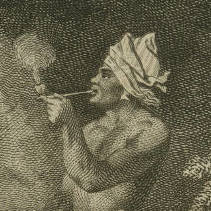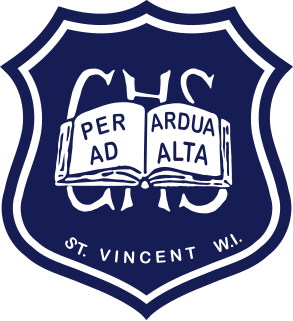Related Research Articles

Saint Vincent and the Grenadines, also often known simply as Saint Vincent, is an island country in the Caribbean. It is located in the southeast Windward Islands of the Lesser Antilles, which lie in the West Indies at the southern end of the eastern border of the Caribbean Sea where the latter meets the Atlantic Ocean.

This article is about the demographics of the population of Saint Vincent and the Grenadines, including population density, ethnicity, religious affiliations and other aspects of the population.

The Kalinago, also known as the Island Caribs or simply Caribs, are an indigenous people of the Lesser Antilles in the Caribbean. They may have been related to the Mainland Caribs (Kalina) of South America, but they spoke an unrelated language known as Island Carib. They also spoke a pidgin language associated with the Mainland Caribs.

Saint Vincent is a volcanic island in the Caribbean. It is the largest island of the country Saint Vincent and the Grenadines island chain. It is located in the Caribbean Sea, between Saint Lucia and Grenada. It is composed of partially submerged volcanic mountains. Its largest volcano and the country's highest peak, La Soufrière, is active, having last erupted in 1979.

The Garifuna people, are a mixed African and indigenous people who are descended from the Black Caribs, who lived on the Caribbean island of Saint Vincent, and speak Garifuna, an Arawakan language.

Black Caribs, also known as Garifuna, are an ethnic group native to the island of St. Vincent. The Black Caribs, or Garinagu, are a mix of Amerindian and African people who intermarried as a byproduct of European colonialism. As of 2011, the Black Caribs make up roughly 2% of the population Saint Vincent and the Grenadines. There remains a significant diaspora of Black Caribs in the Americas.

Joseph Chatoyer, also known as Satuye, was a Garifuna (Carib) chief who led a revolt against the British colonial government of Saint Vincent in 1795. Killed that year, he is now considered a national hero of Saint Vincent and the Grenadines, and also of Belize and Costa Rica. Vincentian politician Camillo Gonsalves described him in 2011 as his country's "sole national hero".
Ebenezer Theodore Joshua was a Vincentian politician and the first chief minister of Saint Vincent from 1961 to 1967. He was the Leader of the Legislative Council from 1956 to 1961.
Garifuna (Karif) is a minority language widely spoken in villages of Garifuna people in the western part of the northern coast of Central America.
Saint Vincent and the Grenadines Rugby Union is the governing body for rugby union in Saint Vincent and the Grenadines. It is considered a Tier 3 rugby nation by World Rugby of which it is a full member. It is also a member of the Rugby Americas North (RAN). Saint Vincent and the Grenadines men's and women's teams compete regionally against other teams in this group.

Baliceaux is a small, privately owned Caribbean island and is one of the Grenadines chain of islands which lie between the larger islands of Saint Vincent and Grenada. Politically, it is part of the nation of Saint Vincent and the Grenadines.

The monarchy of Saint Vincent and the Grenadines is the constitutional system of government in which a hereditary monarch is the sovereign and head of state of Saint Vincent and the Grenadines, forming the core of the country's Westminster-style parliamentary democracy. The Crown is thus is the foundation of the executive, legislative, and judicial branches of the Vincentian government. While Royal Assent and the royal sign-manual are required to enact laws, letters patent, and orders in council, the authority for these acts stems from the Vincentian populace, and, within the conventional stipulations of constitutional monarchy, the sovereign's direct participation in any of these areas of governance is limited, with most related powers entrusted for exercise by the elected and appointed parliamentarians, the ministers of the Crown generally drawn from amongst them, and the judges and Justices of the Peace.

Afro-Vincentians or Black Vincentians are Vincentians whose ancestry lies within Sub-Saharan Africa.

Fort Charlotte is a British-colonial era fort, built on a hill over-looking the harbour of Kingstown, Saint Vincent. It is located in the parish of Saint Andrew, Saint Vincent and the Grenadines at the top of Edinboro road, on Berkshire Hill, just west of the town.

St. Vincent Girls' High School is a secondary education facility opened in Kingstown on the island of St. Vincent in Saint Vincent and the Grenadines. The school was founded by Mary L. Ince in 1911 at the corner of Linley and Tyrell Street in Kingstown. In 1914, the government took over operation of the school and made Ince the headmistress. The following year, students began participating for the first time in the Cambridge Examinations. By 1918, the school had a staff of 3 teachers and 16 students and functioned as a secondary school for middle-class pupils, who were able to afford the 6£ per year fee, as elites could afford to send their children to Barbados or Britain for higher education. In 1935, the school relocated to its present location on Murray Road in Kingstown to a site known as the Judges Lodge. The school's students consistently rank highly in the Caribbean Secondary Education Certificate examinations, with pass rates over 95%. In every year since 2000, the school has had the highest rate of students passing the examination in the country.
St Clair Leacock is a Vincentian politician. He is the opposition parliament member in Saint Vincent and the Grenadines Leacock is also the New Democratic Party Central Kingstown candidate for 2020 Vincentian general election.
Rhoda Reddock is a Trinidadian educator and social activist. She has served as founder, chair, adviser, or member of several organizations, such as the Caribbean Association for Feminist Research and Action (CAFRA), the Global Fund for Women, and the Regional Advisory Committee of the Global Coalition on Women and AIDS established by UNAIDS. In 2002 she received the Seventh CARICOM Triennial Award for Women, was Trinidad and Tobago's nominee for the International Women of Courage Award in 2008, and was honoured in her country's National Honour Awards ceremony in 2012 with the Gold Medal for the Development of Women.
Rosalind Ambrose is a Vincentian radiologist who has been instrumental in the development of the field in her country and throughout the Caribbean region. She served as Director of Education for the Kingstown Medical College, was a founding member of the Caribbean Society of Radiologists, and was President of the St. Vincent and the Grenadines Medical Association from 2001 to 2010.

Mexico–Saint Vincent and the Grenadines relations refers to the diplomatic relations between the United Mexican States and Saint Vincent and the Grenadines. Both nations are members of the Association of Caribbean States, Organization of American States and the United Nations.
References
Citations
- ↑ Twin 2006, p. 105.
- ↑ Crawford 1983, p. 161.
- ↑ Garraway 2009.
- 1 2 3 4 University of the West Indies 2013.
- 1 2 Green 1997, p. 238.
- 1 2 Lewis 2002, p. 240.
- ↑ Green 1997, p. 240.
- ↑ Minutes 1985.
- ↑ Twin 2006, pp. 101-102.
- ↑ Humes 2011.
- ↑ Garraway 2012a.
- ↑ Sweeting 2010, p. 106.
- ↑ The Vincentian 2012.
- ↑ The Galveston Daily News 1995, p. 5.
- ↑ Madeley 2003, p. 50.
- ↑ Watson, Leander-Watson & Allbrook 2007, p. 27.
- ↑ Bloom 2012.
- ↑ The Gleaner 2005, p. 89.
- ↑ Caricom Secretariat 2003.
- ↑ Formisano & Moghadam 2005, p. 16.
- ↑ The Vincy 2009, pp. 2, 10.
- ↑ Garraway 2012b.
- ↑ The Vincentian 2013.
Bibliography
- Bloom, Linda (7 March 2012). "UN Explores Needs of Rural Women". Ministry with the Poor. Dallas, Texas: General Board of Global Ministries of the United Methodist Church. Archived from the original on 11 February 2018. Retrieved 14 February 2018.
- Crawford, M. H. (1983). "The Anthropological Genetics of the Black Caribs (Garifuna) of Central America and the Caribbean". Yearbook of Physical Anthropology . 26 (Supplement S1): 161–192. doi: 10.1002/ajpa.1330260508 . ISSN 2331-1371.
- Formisano, Maritza; Moghadam, Valentine M. (November 2005). Women in the Judiciary in Latin America: An Overview of Progress and Gaps (PDF) (Report). Paris, France: UNESCO. Social and Human Sciences Sector Paper #5. Archived from the original (PDF) on 15 April 2017. Retrieved 12 February 2018.
- Garraway, Sheron (6 March 2009). "A friendship that's making a difference". Kingstown, St. Vincent and the Grenadines: The Searchlight. Archived from the original on 11 February 2018. Retrieved 11 February 2018.
- Garraway, Sheron (16 August 2012a). "Emancipation Story told to children". Kingstown, St. Vincent and the Grenadines: The Searchlight. Archived from the original on 11 February 2018. Retrieved 14 February 2018.
- Garraway, Sheron (June 2012b). "Newly elected executive for NCW". Kingstown, St. Vincent and the Grenadines: The Vincentian. Archived from the original on 11 February 2018. Retrieved 14 February 2018.
- Green, Charles (1997). Globalization and Survival in the Black Diaspora: The New Urban Challenge. Albany, New York: SUNY Press. ISBN 978-1-4384-0471-4.
- Humes, Aaron (22 November 2011). "The "19th" in Dangriga—time to remember, and celebrate". Amandala . Belize City, Belize. Archived from the original on 18 June 2017. Retrieved 14 February 2018.
- Lewis, Patsy (2002). Surviving Small Size: Regional Integration in Caribbean Ministates. Mona, Jamaica: University of the West Indies Press. ISBN 978-976-640-116-0.
- Madeley, John (2003). A People's World: Alternatives to Economic Globalization. London, England: Zed Books. ISBN 978-1-84277-223-2.
- Sweeting, Lynn (2010). The WomanSpeak Journal. 5. Nassau, Bahamas: The Women Speak Press. ISBN 978-1-365-40638-6.
- Twin, Paul (2006). "Land Ownership and the Construction of Carib Identity in St. Vincent". In Forte, Maximilian Christian (ed.). Indigenous Resurgence in the Contemporary Caribbean: Amerindian Survival and Revival. New York, New York: Peter Lang Publishing. pp. 89–106. ISBN 978-0-8204-7488-5.
- Watson, Noel; Leander-Watson, Denise; Allbrook, Miranda (October 2007). Pilot Study To Assess the likely Impact of the Free Movement of Labour in the CSME on the OECS Labour Market (PDF) (Report). Washington, D.C.: Inter-American Development Bank. Archived from the original (PDF) on 14 February 2018. Retrieved 14 February 2018.
- "Caribbean group warns of global threats to women's concerns". The Gleaner . Kingston, Jamaica. 17 March 2005. p. 89. Retrieved 14 February 2018– via Newspaperarchive.com.

- "Commonwealth women address MDG Issues". Kingstown, St. Vincent and the Grenadines: The Vincentian. 28 June 2013. p. 14. Retrieved 14 February 2018.
- "Dr. Adams gets Writers' First Lifetime Award". Kingstown, St. Vincent and the Grenadines: The Vincentian. 25 September 2012. Archived from the original on 14 February 2018. Retrieved 14 February 2018.
- "Honoree: Nelcia Robinson". Institute for Gender and Development Studies. St. Augustine, Trinidad: University of the West Indies. 8 November 2013. Archived from the original on 18 March 2015. Retrieved 12 February 2018.
- "Independence and Homecoming" (PDF). The Vincy (2): 1–10. November 2009. Archived from the original (PDF) on 12 February 2018. Retrieved 12 February 2018.
- "Membership Finalised for (1) Regional Judicial and Legal Services Commission, and (2) Board of Trustees of the CCJ Trust Fund". CARICOM.org. Georgetown, Guyana: The Caribbean Community. 13 August 2003. Archived from the original on 12 February 2018. Retrieved 12 February 2018.
- "Minutes of the Launching of The Caribbean Association for Feminist Research and Action (CAFRA)". CAFRA-regional.org. Hastings, Barbados: Caribbean Association for Feminist Research and Action. 1 April 1985. Archived from the original on 12 February 2018. Retrieved 12 February 2018.
- "Women's Day launched in Denmark". The Galveston Daily News . Galveston, Texas. Associated Press. 9 March 1995. p. 5. Retrieved 14 February 2018– via Newspaperarchive.com.
